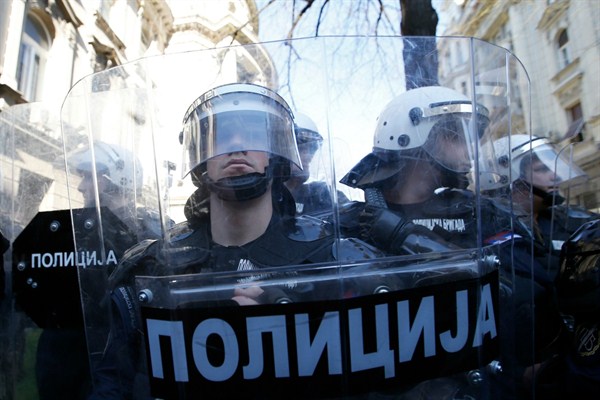Anti-government protests have been taking place every week in Serbia since late last year, underscoring widespread frustrations with the government and concerns about President Aleksandar Vucic’s consolidated hold on power.
Vucic and his political party, the Serbian Progressive Party, have been content to shrug off the protests and cite them as evidence that, contrary to what his critics may say, dissent is alive and well in the country. Yet as Aleks Eror points out in this week’s in-depth report, the president can respond dismissively to the protests precisely because of the strength of his political position and his ability to co-opt the media and the courts.
Eror, a Serbian-born journalist, draws parallels between the country’s current political climate and the rule of former dictator Slobodon Milosevic, who was forced from office nearly two decades ago, in October 2000. While many hoped that transfer of power would usher in an era of reliable democratic governance and reconciliation across a volatile region, Eror argues that the opposite is happening, and that the specter of dictatorship has returned.
In this week’s podcast interview, he talks with WPR’s senior editor, Robbie Corey-Boulet, about why Serbia has failed to come to terms with the abuses of the Milosevic era, and how that has facilitated Vucic’s rise. He also describes the role of foreign powers, notably the European Union, in buttressing Vucic’s government.
If you like what you hear on Trend Lines and what you’ve read on WPR, you can sign up for our free newsletter to get our uncompromising analysis delivered straight to your inbox. The newsletter offers a free preview article every day of the week, plus three more complimentary articles in our weekly roundup every Friday. Sign up here. Then subscribe.
Listen:
Download: MP3
Subscribe: iTunes | RSS | Spotify
Relevant Articles on WPR:
Two Decades After the Fall of Milosevic, Dictatorship Is Returning to Serbia
Serbia’s Protests and the Growing Discontent With Western Priorities in the Balkans
Why Demands for a Free Press Are Front and Center in Serbia’s Protests
The Feud That Captures the Fight for Serbia’s Future
Trend Lines is produced and edited by Peter Dörrie, a freelance journalist and analyst focusing on security and resource politics in Africa. You can follow him on Twitter at @peterdoerrie.
To send feedback or questions, email us at podcast@worldpoliticsreview.com.

